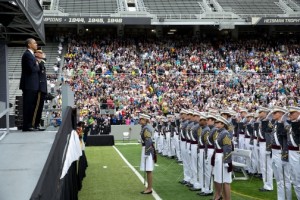 After months of criticism from hawks on the right and humanitarian interventionists on the left about its alleged projection of “weakness” on the world stage, the Obama administration hit back this week with a speech by the President at the West Point military academy designed to lay out his foreign policy “vision.”
After months of criticism from hawks on the right and humanitarian interventionists on the left about its alleged projection of “weakness” on the world stage, the Obama administration hit back this week with a speech by the President at the West Point military academy designed to lay out his foreign policy “vision.”
On paper, there was much to admire in the speech. Obama made it plain that he hopes to scale back the role of the military in U.S foreign policy by avoiding wars like those in Iraq and Afghanistan, beefing up diplomacy and economic development programs, taking real steps to address the climate change crisis, and focusing on reviving the U.S. economy as a foundation of future security. He even used a common refrain of the peace movement, noting that if all one has is a hammer every problem looks like a nail. In other words, an overdeveloped military is more likely to be used than one that is balanced by other instruments of policy.
So far, so good. But Obama contradicted his peace-oriented rhetoric by reiterating his belief in “American exceptionalism” – the notion that the United States has virtually a God-given right and responsibility to play a dominant role in any conflict or crisis in the world. He talked about the world looking to America for everything from helping respond to a typhoon in the Philippines to responding to kidnappings in Nigeria. It didn’t seem to occur to him that there are some problems that might be better solved without U.S. involvement, or that there are some situations where American intervention, no matter how well intentioned, actually makes matters worse.
Taken as a whole, the Obama speech was a plea for continued activism in U.S. foreign policy, pursuing similar objectives with different tools. Nowhere was this clearer than in his call for an open-ended “Counterterrorism Partnership Training Fund” (CPTF) of up to $5 billion that could be used in Syria, Yemen, Turkey, Jordan, Mali, Somalia or anywhere else the United States government perceives a terrorist threat.
Obama praised his own efforts to isolate Russia over its intervention in the Ukraine without acknowledging that prior U.S. actions like expanding the NATO military alliance up to Russia’s borders had contributed to the climate in which Vladimir Putin made his power grab in the Crimea. This does not justify Russia’s actions by any means, but it does indicate that U.S. actions to expand its power and leverage – like dramatically expanding NATO at the end of the Cold War after promising Moscow it would not do so – can provoke negative consequences that are not adequately considered at the time that expansionist measures are contemplated.
On the question of China’s conflict with its neighbors over the resources contained beneath the South China Sea, Obama rightly suggested that diplomacy is the preferred option for resolving the crisis, and chided the U.S. Congress for failing to ratify the Law of the Sea Treaty, which is designed to deal with just this sort of situation. But there was no suggestion that this realization would take the military edge off of the administration’s much discussed “pivot to Asia,” which from the Chinese perspective is seen as an attempt to bottle it up in its own waters and limit its ability to act as the key player in its region.
One could imagine the reaction if China launched a “pivot to the Americas” in which it established new military bases, expanded its naval operations close to U.S. waters, and developed a range of new long-range strike weapons designed to increase its ability to accurately hit U.S. targets on short notice. Any resolution of the problems in the Pacific will ultimately require Washington to acknowledge that China is and will continue to be the major power in East Asia, and that economic cooperation and diplomacy are more promising means of interaction than military buildups.
But for all of its flaws, the Obama foreign policy offers more promise than anything likely to be offered by Hillary Clinton or any of the most likely candidates for the U.S. presidency in the 2016 election. One exception could be Rand Paul, whose libertarian, non-interventionist instincts are in keeping with a less militarized foreign policy. But even Paul has hardened his rhetoric on issues like how to approach Iran’s nuclear program, no doubt in hopes of reaching out to the hawkish wing of his party.
All of the above suggests that progressives need to take a two track approach to the Obama foreign policy – supporting his non-interventionist tendencies and diplomatic overtures (like the Iran nuclear talks) while continuing to oppose his use of Special Forces, drone strikes, and global surveillance as ways to sustain U.S. military interventionism in a post-Iraq, post-Afghanistan world.
The alternative – the neo-conservative reflex to shoot first and ask questions later – would be even worse than the worst elements of the Obama approach, as the Iraq and Afghan wars have amply demonstrated.
William Hartung is the director of the Common Defense Campaign: Arms and Security Project at the Center for International Policy. He has also been the director of the Arms and Security Initiative at the New America Foundation as well as the director of the Arms Trade Resource Center at the World Policy Institute. Bill Hartung’s latest book is Prophets of War: Lockheed Martin and the Making of the Military-Industrial Complex (Nation Books, 2011). He has been published and featured in The New York Times, the Washington Post, the Los Angeles Times, The Nation, The World Policy Journal, CBS 60 Minutes, NBC Nightly News, and is a columnist for the Americas Program www.americas.org.




